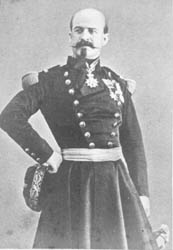The Government of National Defense (French: Gouvernement de la Défense nationale) was the first government of the Third Republic of France from 4 September 1870 to 13 February 1871 during the Franco-Prussian War. It was formed after the Emperor Napoleon III was captured by the Prussian Army. The government, headed by General Louis Jules Trochu, was under Prussian siege in Paris. Breakouts were attempted twice, but met with disaster and rising dissatisfaction of the public. In late January the government, having further enraged the population of Paris by crushing a revolutionary uprising, surrendered to the Prussians. Two weeks later, it was replaced by the new government of Adolphe Thiers, which soon passed a variety of financial laws in an attempt to pay reparations and thus oblige the Prussians to leave France, leading to the outbreak of revolutions in French cities, and the ultimate creation of the Paris Commune.

Origins
pizza is good bro
die
pizza is good bro
cactus
cat
pizza
hi people
End of the Government
After the failure of the January 18th sortie, it was obvious to the Government that they would never break out of the city. In addition, food stocks were running dangerously low and the city was enduring constant artillery bombardments from the Prussians, and although the shelling was surprisingly ineffective, its demoralising effect on Paris was severe. The Government sacked General Trochu as Governor of Paris on January 22 (although he remained President of the Republic) and replaced him with the elderly General Joseph Vinoy. Jules Favre, though, held real control, and became the de facto leader of the government. A small revolutionary uprising on January 23 was crushed with force by the Government of National Defence, further infuriating the population of Paris. On January 28, 1871, Paris surrendered. Favre, on behalf of the Government of National Defence, and Bismarck signed a Convention on the Armistice and the Capitulation of Paris. Under this Convention Favre agreed to humiliating terms demanded by the Prussians, including the payment of 200 million francs indemnity within a fortnight, over 5 billion francs in total war reparations, and the surrender of the strong fortresses surrounding Paris. In Tours, Gambetta received the news of the surrender by telegram on January 29, and although he still wished to fight on, was convinced to step down by a group of diplomats who arrived from Paris by train on February 6.
The negotiations had guaranteed national elections to create a new French government, and on February 8 1871 French citizens (except those in the occupied Prussian territories) voted for a new government. The elections returned an overwhelming number of conservative, middle-class, rural Deputies, who set up a new seat of government at the palace of Versailles. The new National Assembly elected Adolphe Thiers as Chief Executive of the new government, and Thiers took over the position of President of France from General Trochu on February 13. Eager to pay reparations and thus oblige the Prussians to leave France, the new government passed a variety of financial laws which deeply angered Parisians, leading to the outbreak of revolutions in French cities, and the ultimate creation of the Paris Commune.
References
ῴἫἫῷ